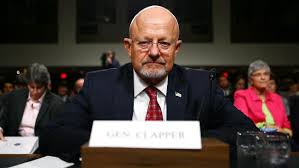Information, is has been said, is power. It should, therefore, come as no surprise that the US government would seek to accumulate as much information as possible. PRISM, the electronic surveillance and data collection efforts run by the United States National Security Agency (NSA), is the latest in a series of initiatives designed to harvest and store personal information. The program pertains to Americans in contact with people living outside the US as well as customers of the participating corporations. Facebook and Google are two companies that have made billions off personal data. By tracking individual preferences, the companies have been able to utilize the most accurate information in order to sell products to consumers most likely to buy them. This is information is vitally important to PRISM.
No Strings Attached
[captionpix align=”left” theme=”elegant” width=”320″ imgsrc=”http://natoassociation.ca/wp-content/uploads/2013/06/jamesclapper.jpg” captiontext=”Director of National Intelligence James Clapper. “]
In one example, the US government has been collecting the electronic metadata (data about the content of data) of millions of Americans from the company Verizon on a daily basis through PRISM. The scale is massive. This information was leaked by Edward Snowden, a 29-year-old former contractor. Snowden claimed that the NSA had be monitoring foreigners. Indeed, the Obama administration has raised domestic surveillance levels to all time highs.
Large-scale wireless surveillance had previously been conducted by the Bush Administration from 2001 to 2007. It was only after a significant uproar, and a judge’s ruling the surveillance unconstitutional, that the program ceased. Evidently no lessons about safeguarding the rights of citizens have been learned from this episode. The US Department of Justice is on record as stating that the NSA has accumulated, and continues to accumulate, more data than it requires when performing wiretaps. Instead of restating Washington’s responsibility to protect the individual freedoms of its citizens, the FISA Amendment Act in 2008 was passed to relax oversight with regards to surveillance programs.
With the unveiling of PRISM, the Obama administration has shown it continues to follow the same path. Going even further, whistleblowers are being persecuted with greater intensity than ever before. Snowden is facing charges of treason for his actions. Right now, Washington seems more concerned with punishing Snowden for disclosing documents than rectifying a major invasion of peoples’ privacy.
What is most troubling about these measures is that American technology companies have been giving access to their data without a court order. Microsoft, Yahoo!, Google, Facebook, PalTalk, YouTube, AOL, Skype and Apple have all shared their data voluntarily. With the exception of Twitter and LinkedIn, these companies represent the vast majority of social networking and personal information sites in the United States.
This is a gross violation of consumer trust. By volunteering their information in the name of national security, these companies have colluded to share their clients’ information without their consent.
Accused companies such as Google, Facebook and Microsoft have commented that they have not co-operated with the program. Whether or not these companies are being truthful remains to be seen.
Eaves-Dropping the Ball
PRISM is able to function because of two key pieces of legislation: the Protect America Act and the FISA Amendments Act. The latter allowed for companies to escape legal penalties in exchange for voluntarily sharing their data. By incentivizing companies to share their data the NSA has gained an enormous amount ofdata at the cost of violating the rights of millions of consumers. The FISA (Foreign Intelligence Services Act) pertains to the Foreign Intelligence Services Court (FISC). The court was created by the act specifically to deal with foreign intelligence agents within the US. FISA also allows US authorities the widespread ability to survey its citizens in the name of terrorism without a warrant. By removing the need for a judge to issue a warrant for surveillance, the US government has removed a crucial piece of oversight from its domestic police organizations. The NSA has, in essence, been allowed to police itself. This lack of check sets a worrying precedent.
Snowden’s claims have experienced some pushback. Former NSA experts have argued that Snowden overstated the value of the data he shared. Snowden’s claim that the NSA has the ability to target any American at any time is disputed by a former lawyer at the NSA. The NSA is also subject to strict internal regulation in addition to the FISC. However, by allowing warrantless surveillance, the NSA is being allowed to sidestep one of the purported checks on its power by the very organization it is designed to protect. The court has not proven it is willing to curb the powers of those it is supposed to be monitoring. The ACLU went so far as calling the FISC a ‘paper tiger.’
James Clapper, the Director of National Intelligence, has also refuted Snowden’s claims. Clapper stated that the program cannot be used to directly target an individual American or anyone currently within the United States and maintained that FISC supervision remains active. The veracity of Clapper’s claims is uncertain. His citation of the court is problematic, as the court has allowed warrantless wiretapping to occur previously. With the court reduced to a rubber-stamping role, most of Clapper’s defence can be attributed to trusting the NSA to have robust protocols in place without defining what they are. Previously, NSA surveillance had been construed as an honest mistake that had been rectified. By relying so heavily on internal checks and balances, it remains impossible to verify whether or not the system works.
The NSA’s ability to conduct warrantless surveillance sets a troubling new precedent. That Washington would appear to be taking a page out of the dictatorial playbook in the name of preventing terrorism is troubling. Washington and the involved corporations have so far given little more than empty assurances that the system is not being abused. Greater checks and balances, such as the reform of FISC to ensure it acts as an independent and robust body, are required in order for a democracy to function properly. To quote Benjamin Franklin, “They who can give up essential liberty to obtain a little temporary safety, deserve neither liberty nor safety.”




